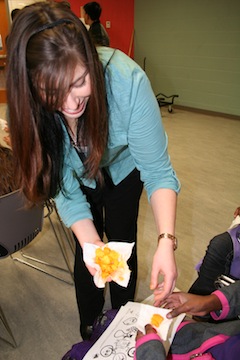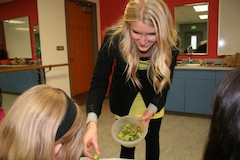More fruit, please! Idaho State University-Meridian dietetic interns teach children about nutrition
March 8, 2013
Think most kids would choose a handful of Reese’s Pieces over raspberries? A Milky Way bar over a mango?
Not always.
 Children at the Morley Nelson Community Center in Boise are giving fruit the thumbs up, thanks to Meagan Horne and Andrea Ovard, two of eight interns in the dietetics program at the Idaho State University-Meridian Health Science Center.
Children at the Morley Nelson Community Center in Boise are giving fruit the thumbs up, thanks to Meagan Horne and Andrea Ovard, two of eight interns in the dietetics program at the Idaho State University-Meridian Health Science Center.
On a recent Monday afternoon, Horne and Ovard taught first through sixth graders the benefits of eating fruit.
The interns were working under the supervision of clinical associate dietetics professor and internship director, Ruth Schneider.
The three asked the children to identify various fruits and quizzed them on the nutritional benefits. Then they handed pieces of mango, papaya, kiwi and raspberries to the children, explaining they were packed with vitamin C which can boost the immune system.
“Why should you eat fruit?” asked Horne.
“It helps heal your cuts and bruises,” responded Genesis Smith, a fifth grader who said she eats an apple for breakfast and grows raspberries in her backyard during the summer.
 Schneider showed the children how to prepare a mango by slicing the fruit into bite-sized cubes and removing them from the skin.
Schneider showed the children how to prepare a mango by slicing the fruit into bite-sized cubes and removing them from the skin.
“Sweet,” said Smith as she popped a piece into her mouth.
One child wanted to know where he could buy mangoes in Boise, and Schneider told him to check the produce section in the grocery store.
The afterschool nutrition lesson was made possible through a federal project called CHAMP—Cities Combating Childhood Hunger through Afterschool Meal Programs—and companion funding provided by the Idaho Hunger Relief Task Force and other community partners.
The project’s goal is to eliminate childhood hunger in Boise’s most vulnerable neighborhoods. In addition to afterschool meals, the program provides children and their families with information about nutrition, food preparation and the importance of physical activity in preventing obesity.
ISU dietetic interns have written the nutritional lessons which they’ll continue to present each Monday through early June. They’ve also prepared lessons community center staffers present throughout the week.
Topics include food safety, the benefits of vegetables and how food is grown. Community center officials say the knowledge is invaluable to children who will help with the center’s community garden this summer.
Horne and Ovard say the program is an excellent opportunity to share their knowledge of nutrition with children.
“These kids are growing,” said Horne. “They need to implement the principles of good nutrition while they are young.”
###
Categories:
